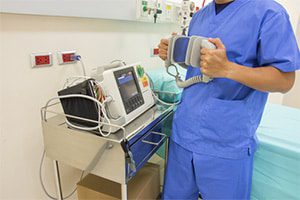
FDA Issues a Class I Recall of Boston Scientific’s Emblem S-ICDs Due to Reports of Injuries and Deaths FDA – The U.S. Food and Drug Administration has specified a recall of Boston Scientific’s Emblem subcutaneous electrode as a Class I event after 26 reported injuries and one fatality linked with the medical device. According to Boston Scientific, the […]

Defibrillator system
FDA – The U.S. Food and Drug Administration has specified a recall of Boston Scientific’s Emblem subcutaneous electrode as a Class I event after 26 reported injuries and one fatality linked with the medical device. According to Boston Scientific, the company initiated the process of recalling the subcutaneous implantable cardioverter defibrillator (S-ICD) system electrode in December after discovering the device’s potential to fracture, causing the device to fail. The Boston Scientific Emblem S-ICD is designed to slow down very fast heartbeats connected with a cardiac arrest event.
To decrease the risks, Boston Scientific asks physicians to enroll their patients in the company’s remote monitoring service and ask the patients to conduct weekly checks. Doctors are asked to perform a system review with their patients every three months.
There are 90,000 patients who have a Boston Scientific Emblem S-ICD. The devices have been sold in the United States for about ten years. According to news sources, there is new evidence that the use of the Boston Scientific’s Emblem S-ICD is effective in preventing death during a sudden cardiac arrest.
Boston Scientific has distributed more than 47,000 of the recalled Emblem S-ICDs since 2017. The company has discovered some rare problems with medical devices. Boston Scientific has received as many as 27 reports of “electrode body fractures at a location just distal to the proximal sense ring.”
Although the electrode fracture is a rare occurrence, Boston Scientific estimates the fault’s cumulative occurrence rate at 0.2% at the 41-month mark. However, when the electrode fractures, the consequences are severe. For example, one reported case stated that a patient’s electrode lead fractured, causing the device to die. The other 26 cases caused severe injuries.
Boston Scientific is requesting that physicians help to reduce the possibility that an electrode fracture will harm their patients. For example, remote monitoring is essential to the plan’s success. By enrolling and monitoring patients through the LATITUDE remote monitoring program, detecting a potential high electrode impedance alert or mechanical artifacts stored S-ICDs may be reviewed during the in-office medical device checks. Also, doctors are asked to instruct their patients to complete the weekly remote interrogations.
Parker Waichman LLP helps families recover compensation for deaths and injuries caused by a recalled defibrillator electrode. Trust your case with our defective defibrillator lead lawyers. For a free consultation, contact our law firm today by using our live chat or calling 1-800-YOUR-LAWYER (1-800-968-7529).


